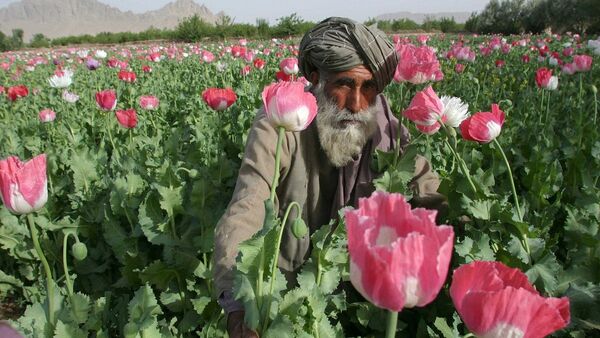Because opium is worth so much more than any other crop available to Afghan farmers, for many it is the only way to survive.
With farmers reliant on poppy-growing seeking to ‘insure' themselves before the withdrawal of NATO combat forces, cultivation expanded to 224,000 hectares (553,000 acres) in 2014, according to a survey by the UN Office on Drugs and Crimes (UNODC). Just 74,000 hectares was being used to grow poppies in 2002, a year after the Taliban regime was toppled.
The number of hectares used for poppy cultivation has almost doubled over the past 10 years, from just over 125,000 to the new figure of 224,000.
The latest figures illustrate the challenge new President Ashraf Ghani faces in tackling the insurgency when the foreign combat mission ends. British troops have left and US troops are due to withdraw by the end of 2014.
Blow for Britain, Russia
The figures are disappointing for Britain, which pulled the last of its forces out of Helmand province in October. Part of their mission was to reduce poppy production. However, British efforts to persuade farmers to switch to other crops appear to have failed.
While Prime Minister David Cameron hailed the forces' mission as complete, defence analysts said that the opium trade was an enduring problem.
Both the UK and Russia are destination countries for heroin produced from Afghanistan, which provides more than 80 per cent of the world's illicit opium.
For Russia, the ever-spiralling figures bring increased concern that there will be more Afghan opium making its way into the country via central Asia.
Russia has reported a surge in heroin-related deaths over the past 10 years, and has repeatedly criticised NATO countries for failing to stamp out the problem. It is estimated that 90 per cent of Russia's drug addicts use Afghan-sourced heroin.
Good Western intentions?
UNODC has warned that transforming Afghanistan's corrupt economy could take up to 20 years.
President Ghani, who is co-author of the book Fixing Failed States, argues that a "citizen-based approach" is the only way to improve the economy, with sustained foreign aid matched to practical knowledge of local circumstances. He has suggested that, for example, if Western tariffs against Afghan textiles were lifted, cotton could become a viable alternative to poppies.
British MP and chair of the UK Parliament Defence Committee Rory Stewart is a diplomat and author who is often consulted as an adviser on Afghanistan. He has lived and worked in Kabul, where he set up the Turquoise Mountain Foundation, which aims to revive traditional crafts and promote urban regeneration.
In a book review for The New York Times last week entitled Afghanistan: ‘A Shocking Indictment' Mr Stewart asks: "What future was there for the Afghan economy when… it relied on servicing, supporting, and seeking rent from two hundred thousand foreign soldiers and civilian contractors, and where Afghan ‘businessmen' were often simply warlords profiting from security, supply, and construction contracts generated by US military bases?"
"We need to be asking ourselves whether Western institutions, conceptual models, weapons, and dollars "defeat our own stated objectives" when we intervene in other nations, he says.
"These are the kinds of questions-rooted in politics, culture, and lived experience-that we should have been posing in Afghanistan, instead of refining universal models of ‘state-building'," he concludes.



